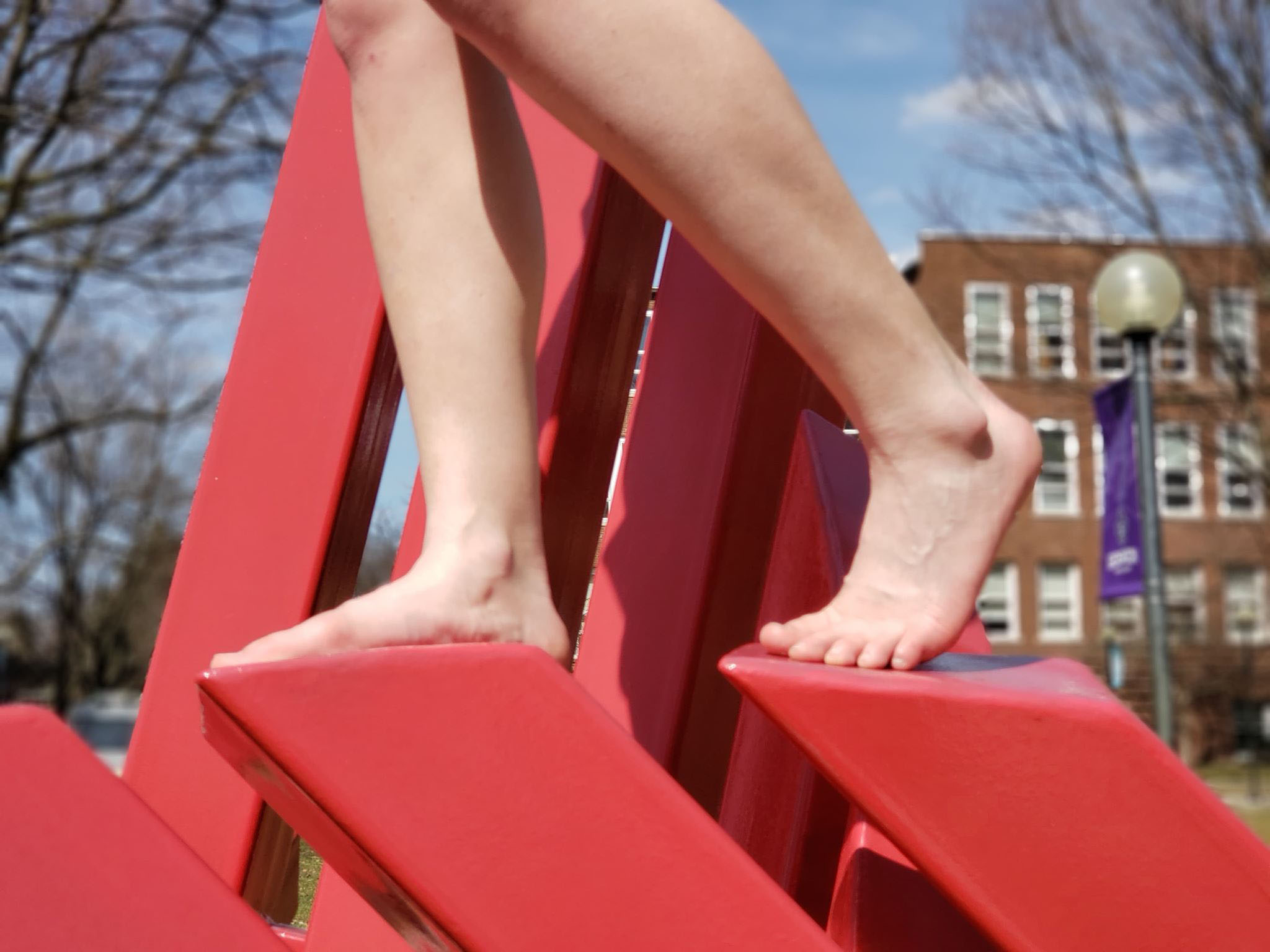As temperatures rise, so do the amount of students choosing to forgo shoes this spring. Not only outdoors or in their dorms, but also in classes and campus buildings. As spring emerges, barefoot season is upon us.
From students to faculty, from the Kratz dorms to the Octavio Romero apartments, there is an established “free the toes” community at Goshen College and anybody can join. It begins with slipping your sandals off in class and progresses to picking up your laundry barefoot until, eventually, you too are a fully-fledged member of the “free the toes” gang.
It is of no surprise that we at GC love our Chacos, Birks and anything that will let toes breathe. But have you ever stopped to really consider why? Does every college campus love going barefoot as much as we do? Is it a Mennonite thing?
Keith Graber Miller, professor of Bible and religion, said he has never worn shoes while teaching and never intends to. He says there are three reasons for this.
First, he says in the Bible, there are multiple instances where God’s people are told to take off their sandals because they are standing on holy ground. Graber Miller said, “I consider teaching a kind of holy practice. I always think it takes a lot of gumption for professors to teach with shoes on, when we are engaging with young people at formative stages in their lives. That has always felt like holy space to me.”
Second, Graber Miller says that when he first starting pastoring, he always kicked his shoes off under the pulpit for the same holy ground reason as well as that he felt more comfortable preaching without shoes. “Once I got into the habit, I was afraid to change that ritual, so I just kept doing it,” said Graber Miller.
Graber Miller’s third reason connects to the patterns in his home and in some international contexts he has spent time in (such as China and Cambodia) where the custom is to remove shoes when entering a home.
At Goshen College, we value worldviews that are unlike our own and we celebrate new customs. Bare feet are seen as a symbol of humility and are customary in both Eastern and Western parts of the world. Although, in the U.S., bare feet are still seen by some as a taboo. Goshen College is an exception.
From Indonesia to Tanzania, many of us get to experience an aspect of barefoot culture firsthand on SST. In the same way that students bring back stories, flavors and colors they have only recently experienced, they also bring back culture. Perhaps that is how barefoot culture began at GC: as a custom borrowed from our study-abroad countries.
Above all, there is a freeing element to being able to walk barefoot, especially this late into the semester when we are all melanin-deprived and stressed beyond our means. As soon as the weather gets warmer, students flock outside to study in hammocks, throw a Frisbee around or simply feel the sun on their skin.
“I think students like the freedom of going without shoes, which makes a lot more sense that having your feet tightly bound in shoes all the time,” said Graber Miller. “A student two decades ago took this to extremes, not wearing shoes throughout the winter, inside or out, and going entirely barefoot during his semester abroad with us in China.”
“Going barefoot connects us to the Earth,” said Heather Gabel, a sophomore sustainability major.
This connection is rooted in the values of the community at Goshen. After a cold winter, we long to feel closer to our Earth and the campus around us.
We are used to hearing “no shirt, no shoes, no service,” but does that apply at GC? Fortunately for the barefoot community, Goshen College does not have a defined dress code that requires students to wear shoes at any given time (with the exception of Westlawn Dining Hall). In fact, many community performances, such as the International Student Coffeehouse, include performers who are barefoot.
“The fact that there is an entire choir on campus who performs barefoot speaks to the flexibility and openness of our community,” said Petra Showalter, a sophomore, in reference to the Voices of the Earth choir. They perform barefoot at the majority of their concerts.
Goshen College fosters an inclusive campus and the barefoot community is no exception to this rule. There is no doubt that this barefoot phenomenon is here to stay, and though not all of us might get it, we respect it.
Perhaps on your next walk to class, consider forgoing the shoes. Though you might get a couple of strange looks, you might be surprised at how many more bare feet you encounter. After all, why should we treat a bare foot any differently than a bare hand?



